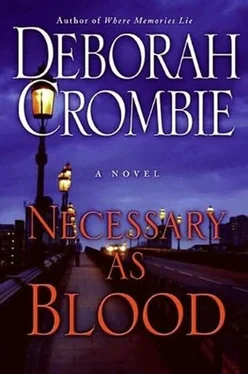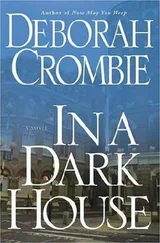Pippa Nightingale’s eyes filled, and she clutched at the skirt of her black jersey dress. “I can’t believe Naz is dead,” she whispered.
There were no chairs in the gallery area. Spying two chrome-and-black-plastic models in the office, Gemma guided Pippa inside, saying, “Here, sit down, why don’t you?” Pippa sank into one of the chairs, the backs of her fingers pressed against her upper lip. “Can I get you some tea or something?” Gemma asked.
Pippa took a shaky breath. “There’s a kettle on the worktable, and some teabags.” She nodded towards the back of the room. Unlike the gallery space, the office was cluttered-it looked as if every bit of detritus that might have sullied the pristine display space had been sucked into this room. Paper spilled from desk and worktable; file folders lay open, disgorging their contents in cascades; stacks of stapled exhibition brochures teetered precariously near edges.
Gemma found the sleek stainless-steel kettle, some obviously hand-thrown pottery mugs, and a box of PG tips. The kettle had water in it, so she flipped the switch and it boiled quickly. She didn’t see milk or sugar, so poured water over the teabags, then stirred the cups for a moment with a used and bent spoon she’d found beside the kettle. She fished out the teabags, tossed them into an overflowing rubbish bin, then carried them round the desk. She cleared a spot for Pippa’s cup, then sat in the other chair, holding her own.
“Thanks.” Pippa’s voice had recovered some of its huskiness. She lowered her hand, taking the pottery cup gingerly by the rim and handle. “Sorry the place is a tip. I haven’t been keeping up with things very well lately. And this…” Her eyes started to tear again and she shook her head.
“You knew Naz, then?” Gemma asked.
“Of course I knew Naz. Sandra and I were friends before they married. It’s not that Naz and I were ever all that close-I think Naz resented my influence on Sandra, and vice versa, I’m sorry to say-but I-” She stopped to sip at the still-steaming tea. “It’s just that-I can’t believe he’s dead. Now I don’t think Sandra will ever come back.” This time the tears ran unchecked down her cheeks.
“You thought Sandra would come home?” asked Gemma, surprised. She realized it was the first time anyone she’d talked to had genuinely seemed to believe it.
“I know it’s stupid, but yes. Somehow I thought she would just walk back into her life one day. But with Naz gone, I can’t imagine Sandra coming back.”
“What about Charlotte?” Gemma felt immediately incensed on Charlotte’s behalf.
“Oh, I don’t mean she didn’t love Charlotte. She adored her. But long before Charlotte was born, Naz and the house were her lodestones, the things that mattered most to her-even more than her work.” This was said with the faintest of frowns on her unlined, almost translucent face.
“Should her work have mattered more?”
“That’s not what I meant.” Some of Pippa’s initial wariness seemed to have returned. “I’m still not quite sure why you wanted to talk to me. I never met any of Sandra’s family.”
“Roy Blakely said you and Sandra hadn’t been as close lately, and that you weren’t representing her work any longer.”
“Sandra told him that?” Pippa stared at her, and Gemma found her pale eyes disconcerting. “It wasn’t that simple. Sandra and I had…a difference of opinion…over the direction her career was taking. I thought she was accepting too many commissions. She should have sold only through exhibitions and galleries-that’s how you build a reputation.” She gestured towards the gallery space. “I have two artists here now who may win major prizes. You won’t find them selling paintings to any Tom, Dick, or Harry who wants something pretty for his sitting room.”
“That’s a bad thing?”
“It is if you want to be taken seriously. And it is a business, make no mistake. Sandra thought art was meant to be seen, and that it was up to the viewer to decide the meaning of a piece.” From Pippa’s tone, Sandra might as well have insisted that the world was flat. “That silliness I could have dealt with by careful marketing, building a mystique,” Pippa went on, “but I could only do that by representing her exclusively.” She drank more of her tea, although Gemma still found it too hot to touch.
“But Sandra wouldn’t agree to that?” she said, as neutrally as she could manage.
“No. Sandra could be infuriatingly stubborn. So I told her in that case I couldn’t represent her at all, thinking it would change her mind. But it didn’t. And there we were.” Pippa hunched over her mug, pushing back the curtain of her long, flaxen hair as it fell over her face. The color, Gemma saw, went all the way to the roots, and at the parting her scalp was pink. “I never meant it to go on,” Pippa said. “It wasn’t worth losing a friendship. And now I can’t take it back.”
“I’m sorry,” Gemma said. “That must be hard. But we don’t know for certain what happened to Sandra.”
“No. But I can’t imagine…and I can’t bear to think of her learning Naz was dead. Do you-I know you said you weren’t officially with the police-but do you know what happened? How-how Naz was killed?”
Knowing that no information about the drugs in Naz’s system had been released, Gemma couldn’t enlighten her, although she wondered what Pippa Nightingale’s reaction would be. Instead, she said, “Pippa, when I came in, you already knew about Naz’s death. Who told you?”
Pippa Nightingale looked up, her delicate eyebrows raised, and Gemma had to resist the urge to look away from those strange eyes.
“Why, Lucas of course,” she said.
Ahmed Azad must have more relatives than most people had acquaintances, Cullen thought as he sat wearily back from the computer screen at his desk.
According to the immigration records Cullen had accessed, Azad had already sponsored nieces, nephews, great-nieces and-nephews, cousins, and a few second cousins thrown in for good measure. Mohammed Rahman, the missing great-nephew, was only the latest ripple in a years’ long flood. And young Mohammed had been working at his uncle’s restaurant, living in his uncle’s house, reporting regularly to his contact with the prosecution-and then he was not. Mohammed Rahman’s blip had simply disappeared from the radar screen.
Cullen had tried every database he could think of, including missing persons and John Does. Mohammed’s friends and acquaintances had been questioned by Immigration, but Cullen would have to institute another go-round.
Nor had he had much better luck with Lucas Ritchie’s former employee Kylie Watters. There had been no activity on her national insurance number, so she wasn’t drawing benefits, and if she was working, it was off the record. The mobile number Melanie had given them was indeed out of service, having been canceled for nonpayment a few days after she had moved out of Melanie’s flat.
Kylie’s national insurance number linked back to an address in Essex. He’d found a phone number through reverse look-up, but there had been no answer. That meant more legwork, as did checking out Lucas Ritchie’s alibi for the day Naz Malik had been killed. The St. John’s Wood address Ritchie had given them was listed as belonging to a Matthew Ritchie, and a quick search had revealed that Matthew Ritchie was not a banker, as Kincaid had speculated, but a record company executive, with two children listed as Lucas and Sarah. So perhaps Ritchie had been telling the truth about the niece’s birthday party, but learning whether all his time could be accounted for would require a personal visit. And family alibis were always liable to be dodgy.
Looking at his watch, Cullen saw that there would be no flat hunting on the agenda that afternoon. As he pulled out his mobile to check in with Kincaid, he thought about the call he’d had earlier from Gemma, asking for Roy Blakely’s address. Should he mention it? Had she told Kincaid, as she’d promised? Either way, Cullen would look like a telltale if he said anything about it, and that irritated him. Whatever her rationale, she was meddling in their case, and he didn’t like it. He disliked even more the fact that he couldn’t complain about it.
Читать дальше












